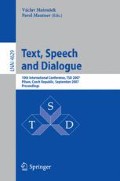Abstract
WordNet has become an important and useful resource for the natural language processing field. Recently, many countries have been developing their own WordNet. In this paper we show an evaluation of the Korean WordNet (U-WIN). The purpose of the work is to study how well the manually created lexical taxonomy U-WIN is built. Evaluation is done level by level, and the reason for selecting words for each level is that we want to compare each level and to find relations between them. As a result the words at a certain level (level 6) give the best score, for which we can make a conclusion that the words at this level are better organized than those at other levels. The score decreases as the level goes up or down from this particular level.
Access this chapter
Tax calculation will be finalised at checkout
Purchases are for personal use only
Preview
Unable to display preview. Download preview PDF.
References
Pantel, P., Lin, D.: Discovering Word Senses from Text. In: Proceedings of ACM SIGKDD Conference on Knowledge Discovery and Data Mining, pp. 613–619 (2002)
Cimiano, P., Hotho, A., Staab, S.: Learning Concept Hierarchies from Text Corpora using Formal Concept Analysis. Journal of Artificial Intelligence 24, 305–339 (2005)
Cicurel, L., Bloehdorn, S., Cimiano, P.: Clustering of Polysemic Words. In: Advances in Data Analysis: Proceedings of the 30th Annual Conference of the German Classification Society (GfKl), Springer, Heidelberg (2006)
Gangemi, A., Guarino, N., Oltramari, A.: Conceptual Analysis of Lexical Taxonomies: The Case of WordNet Top-Level. In: Welty, C., Barry, S. (eds.) Formal Ontology in Information Systems. Proceedings of FOIS 2001, pp. 285–296. ACM Press, New York (2001)
Ho-Seop, Ch., Jee-Hui, I., Cheol-young, O.: Large Scale Korean Intelligent Lexical Network. Hangeul 273, 125–151 (2006)
Miller, G.A., Fellbaum, C., Miller, K.J.: Five papers on WordNet, ftp://ftp.cogsci.princeton.edu/pub/wordnet/5papers.ps
Church, K., Hanks, P.: Word Association Norms, mutual Information and Lexigography. Computational Linguistics 16, 22–29 (1990)
Manning, C., Schutze, H.: Foundations of Statistical Natural Language Processing. MIT Press, Cambridge, MA (1999)
Author information
Authors and Affiliations
Editor information
Rights and permissions
Copyright information
© 2007 Springer-Verlag Berlin Heidelberg
About this paper
Cite this paper
Chagnaa, A., Choe, HS., Ock, CY., Yoon, HM. (2007). On the Evaluation of Korean WordNet. In: Matoušek, V., Mautner, P. (eds) Text, Speech and Dialogue. TSD 2007. Lecture Notes in Computer Science(), vol 4629. Springer, Berlin, Heidelberg. https://doi.org/10.1007/978-3-540-74628-7_18
Download citation
DOI: https://doi.org/10.1007/978-3-540-74628-7_18
Publisher Name: Springer, Berlin, Heidelberg
Print ISBN: 978-3-540-74627-0
Online ISBN: 978-3-540-74628-7
eBook Packages: Computer ScienceComputer Science (R0)

